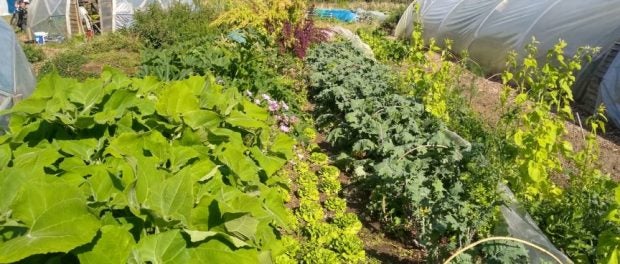Agroecology Resources from AgroecologyNow!

An interesting set of Agroecology Resources is available from AgroecologyNow!
AgroecologyNow! is an initiative convened by the Centre for Agroecology, Water and Resilience in the United Kingdom working with partners including in social movements, civil society, governments and research institutions to promote a transformative agroecology for food sovereignty and social justice: www.agroecologynow.com
See below a number of agroecology resources, including free to download articles and videos.
From Transition to Domains of Transformation: Getting to Sustainable and Just Food Systems Through Agroecology
Check out our new publication presenting 6 “domains of transformation” and focusing on power and governance in transformations for sustainability and social justice: 1) access to natural ecosystems; 2) knowledge and culture; 3) systems of exchange; 4) networks; 5) discourse; and 6) gender and equity. https://www.mdpi.com/2071-1050/11/19/5272
Scaling Agroecology – Some of The Latest Thinking in 5 Edited Collections of Agroecology Resources!
There has been a lot of talk about the scaling of agroecology as a new paradigm for food and agriculture. There have been calls for scaling up, scaling out, massification, transitions, transformations and more. Five recent collections of articles/chapters have recently been published that we thought we’d draw your attention to. https://wp.me/p67WNH-t1
These Extraordinary Times: Indigenous Peoples and Coalition Building for Agroecology and Food Sovereignty
The first in a blog series commissioned to develop ideas circulating during the recent Agroecology Now International Workshop, Carol Kalfatic explores the coalition-building of Indigenous Peoples. As Carol argues, the industrial food system relies on ‘rupture of relationships’; counter to this, Food Sovereignty is based on a solidarity that ‘will reinforce our resilience in the face of increasing unpredictability’. Read the full article here. https://wp.me/P67WNH-r0
Special Issue on Learning for Transformation in Food Movements
This special issue, published in the Journal of Agriculture and Human Values, focuses on the role of popular education, critical pedagogy and adult education – or learning for transformation – in social movements for food sovereignty, agroecology and food justice. https://wp.me/P67WNH-eX
Re/New Alliances: Working Towards Farmer-Scholar Collaboration for Food Sovereignty in North America
The second of the AN! International Workshop blog series is a collaborative piece on newly emergent farmer-scholar networks in North America. Jahi Chapell (Food First), Saulo Araujo (Why Hunger) and Ernesto Mendez (UVermont) give some background on the newly formed Agroecology Action Research Collective (ARC) and ruminate on some of its future challenges. También disponible en español! https://wp.me/p67WNH-r9
A Guide to Mapping For Food System Change
Many people and organisations interested in agroecology and food sovereignty are mapping. It is all the rage! This new publication highlights the issues, challenges and emerging opportunities that might arise when designing mapping processes with the intention of supporting them to be more powerful tools for food system change. https://wp.me/p67WNH-sq
Theories of Change: Understanding & Clarifying Action & Difference
With the final blog in the AN! Series, Josh Brem-Wilson takes up the idea of Theories of Change (ToC). Using ToCs, Josh argues, is a crucial way to understand and communicate our own political positions, and should be more prominent in activist-scholar discourse. https://wp.me/p67WNH-sV
Food Sovereignty Stories from the USFSA – Agroecology Resources
Check out the latest videos in the United States Food Sovereignty Alliance’s #FoodSovereigntyStories video series. Five videos have now been published – making a great resources for learning about different perspectives on food sovereignty: 1) Justice for Farm Workers in Washington State; 2) A Sacred Relationship with Animals, Water, and the Land; 3) Food Sovereignty and Farm Justice for Family Farmers; 4) Urban Food & A Regenerative Economy; 5) Confronting Legacies of Slavery in the Food System. https://tinyurl.com/yyk9y9va
Massification of Agroecology – Video Now Available
This video from a CAWR seminar features Mateo Mier y Terán from research centre ECOSUR in Mexico presenting research from the Agroecology Massification Research Group to highlight key factors that define scaling agroecology. https://tinyurl.com/y4dtxnwx
Farm Hack shows us everything that is wrong with UK Agricultural Training and Research
August 2019 saw the UK’s 4th Farm Hack, an event which brings together farmers to share knowledge and build open-source technologies. This blog offers some reflections on the event, as well as its political significance in the context of the agroecology movement. Read the full article here: https://wp.me/p67WNH-ri
Community rights to land, seeds and natural resources for agroecology in West and East Africa – Video available!
Check out our new video on community rights in Africa and efforts by the food sovereignty movement to better protect them. The videos documents discussions that took place at two workshops organized by P. Claeys and S. Lemke in Mali (with IRPAD) and Uganda (with AFSA) and the methodology used to collectively identify research gaps. Aussi disponible en français! https://tinyurl.com/y46p7xsv
Strengthening Ties with UVM’s Agroecology and Livelihoods Collaborative (ALC) – Agroecology Resources
CAWR has recently signed an MOU to enable ongoing collaborations with University of Vermont’s ALC group who share strong alignments in our commitment to transformative agroecology and food sovereignty. We plan to use this as an opportunity to advance joint research, education and outreach to support an ecologically sound and socially just agrifood system. Read more about ALC here: https://www.uvm.edu/agroecology
- Find more agricultural production resources at https://www.beginningfarmers.org/production-resources/
- Find loads of other great farming resources at https://www.beginningfarmers.org/additional-farming-resources/








 Your Privacy Choices
Your Privacy Choices
Leave a comment